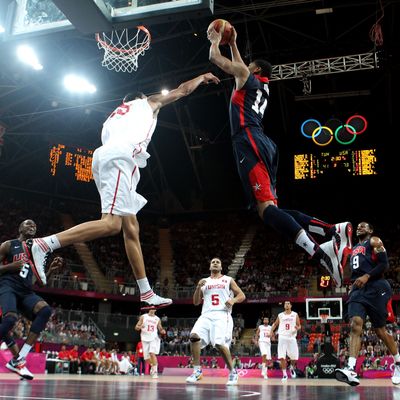
The prohibitive favorite to win the gold medal for a second straight Olympiad, the United States is, in a way, in a stressful position. As the team’s head coach, Mike Krzyzewski has led the U.S. to 55 overall victories (with only one loss) in the past six years, but even if they lose a game but still win gold, the 2012 squad could be considered a failure. Some may claim the pressure does not bother the players — many are veterans of international competition, and have experienced dozens of NBA playoff and championship games — so while Coach K does yoga to maintain balance, the squad has taken to other stress-reducing measures.
Ever since the culmination of the U.S.’s exhibition slate, the squad has stayed loose by engineering pranks, using social media to broadcast their activities. Whenever the hashtag #GotEm appears on Twitter, chances are Kevin Love has posted a photo of the entire team sleeping on an airplane flight (or Deron Williams has snapped a pic of Krzyzewski’s yoga poses). The photos are not really pranks but rather Candid Camera–esque images, and the joking appears to have kept the team sharp and relaxed during the Olympics’ early games — precisely the moment when a slip-up could occur.
The lead up to Tuesday’s final group A contest, pitting the U.S. against Tunisia — the only team in the games without an NBA player on the roster — felt like a first round match in the NCAA tournament. The U.S., a natural No. 1 seed, is free of all obligations on Wednesday, earning some rest before playing Nigeria the following day, and the Vegas spread line for U.S.-Tunisia had eclipsed 50 points by the game’s opening tip. Representing a 16 seed, Tunisia did not seem fazed by the prospect of a blowout, and after roughly seven minutes into the first quarter, Tunisia led by a point. Makram Ben Romdhane was doing his best C.J. McCollum impression, and Tunisia was attempting a Lehigh-style #GotEm (it is worth noting Lehigh was a 15-seed* when the Mountain Hawks upset Duke this past March Madness).
However, the one-point lead was the closest Tunisia came to pulling the upset, and after a 64-32 run over the next two quarters, it was over. Though the game was a shellacking, it yielded far more takeaways than the win over France. The U.S.’s bench will be crucial to withstanding challenges next week, and as evidenced against Tunisia, the second unit is very strong. Composed of Williams, Carmelo Anthony, Kevin Love, Andre Iguodala, and Russell Westbrook, John Schuhmann of NBA.com calculated the second unit’s plus-minus — plus-32 — and the subs outscored Tunisia by 32 points. Much has been made about the mass substitution with a few minutes remaining in the first quarter, but back-to-back games against Tunisia and Nigeria allow more playing time for Love, Iguodala, and Westbrook. While Krzyzewski probably wasn’t thrilled with his starters’ less-than-enthusiastic response to start the game, the U.S.’s hockey-style change was likely a pregame plan. Kobe Bryant was the only Yank to play under ten minutes yesterday, and the U.S. staff is trying to keep each player fresh and game-ready. As Krzyzewski said after the win, “Sometimes finding minutes for twelve people is not easy.”
Though the U.S. did use a small lineup at times on Tuesday, it’s clear the staff realizes the team needs at least one big on the floor. NBA.com’s Schuhmann noted the U.S. was outscored 8-4 by Tunisia without a traditional 5, and the continued emergence of Love in the 2012 games has diminished the need to go small. Despite a scary moment in the third quarter when Love banged knees with a Tunisian defender, the six foot ten Love had a team-high sixteen points in about seventeen minutes of play. Tyson Chandler is a defensive force and will probably be a starter throughout the tournament, but Love’s ability to stretch opposing defenses with his perimeter shooting creates gaps for teammates. When Love is on the court, his defender cannot sag or help off the forward. Chandler’s offensive repertoire is somewhat limited, consisting of setting picks and rolling to the basket (along with the occasional ally-oop or dump down pass), while Love provides a similar defensive presence on the interior but doesn’t clog the lane.
It may be a bit early to begin predicting the starting lineup for the quarter or semifinal rounds, but consider Westbrook a definite option. The U.S.’s best lineup — so far — is Durant, James, Anthony, and the Oklahoma City guard; simply put, there is not one guard among the twelve teams in group A and B who can slow Westbrook in the open court. Two of his eleven points versus Tunisia were the result of a coast-to-coast And-1 layup, Westbrook forcing Tunisian guard Marouan Kechrid to flat-footedly cause a foul. Westbrook even excels at reaching the bucket in the half-court; his quickness, coupled with his hang-time, ensures that if he does not convert the basket, he is going to the free throw line (which explains the 413 free throw attempts in 2012, seventh-highest in the NBA).
Up next is Nigeria, and though there are some familiar faces on the roster (like former Penn great Koko Archibong), the U.S. will earn another W. Based on the lessons learned from Tunisia, look for Love and Westbrook to earn extended minutes, while Bryant, soon to be 34 and the oldest member of the squad, is given additional rest to keep his legs fresh for the tournament’s more crucial tests.
Matt Giles is writing about Olympic basketball for The Sports Section. E-mail him at [email protected]
* This post has been corrected. Lehigh was a 15-seed when they defeated Duke in this year’s NCAA Tournament.